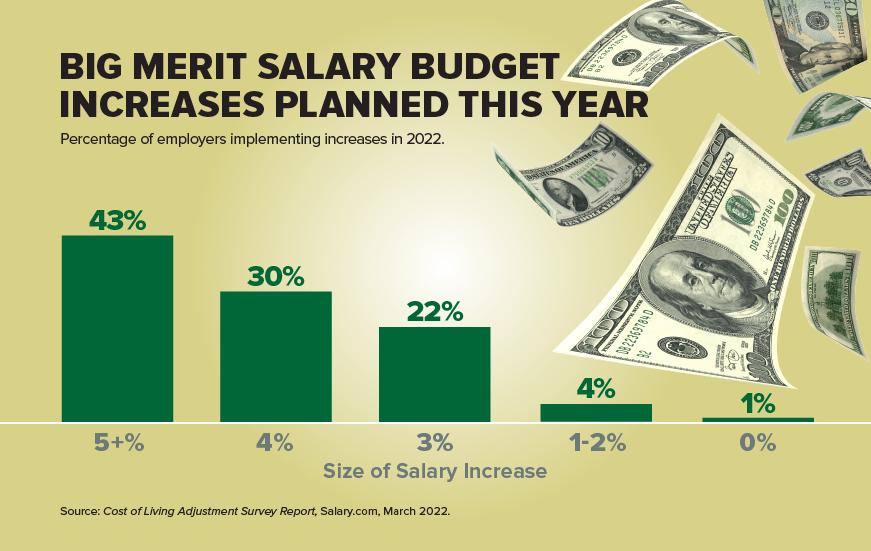High Inflation Means Resetting Pay Strategies
Organizations that don't meet employees' salary expectations risk losing talented workers to employers that will pay more.

With inflation rising and little relief in sight, consumers will feel the pain of higher prices for months to come. For employers, high inflation puts upward pressure on wages and salaries. To hold on to workers, many employers are resetting their pay strategies and increasing their salary budgets for 2022.
"This is the most turbulent compensation environment I've seen in my 30-year career," says Tom McMullen, senior client partner and leader of the North American total rewards group with organizational consultant Korn Ferry in Chicago.
In May, the year-over-year increase in consumer prices hit a fresh 40-year high of 8.6 percent, according to the U.S. Bureau of Labor Statistics. Many economists expect inflation to remain elevated through 2022 and into 2023.
"There's still a lot of inflation in the pipeline, and certainly consumers are going to feel it in the months ahead," Dana Peterson, chief economist at The Conference Board, told CNBC in May.
The long-term average inflation rate in the U.S. has been about 3.2 percent, but consumers had grown used to a more moderate annual price increase averaging only 1.75 percent from 2010 to 2019.
An inflation rate four times higher is wreaking havoc on workers' budgets, as pay increases fail to keep pace with rising prices. Real (inflation-adjusted) average hourly earnings fell 3 percent from May 2021 to May 2022—even as wages and salaries were rising—the BLS reported on June 10.
Numbers are important to understand the effects of inflation, so here are a few more to keep in mind:
- Over the 12-month period ending in May, average hourly earnings (nonfarm payrolls) increased by 5.2 percent, down just slightly from the April year-over-year increase of 5.5 percent, the BLS reported on June 3.
- For the 12-month period ending in March, the BLS reported that wage and salary increases ranged from 4 percent for construction and maintenance occupations to 7.8 percent for service occupations.
- Hourly wages have been rising faster than salaries, with annual wage growth reaching 6.1 percent in May, according to the Federal Reserve Bank of Atlanta's wage tracker.
Evolving Employee Expectations for Higher Pay
As inflation keeps rising, so do employees' expectations for higher wage and salary increases. A survey of 5,000 U.S. workers conducted in April by Grant Thornton LLP, an audit, tax and advisory firm, found that among the respondents:
- 40 percent expect pay raises greater than 6 percent this year.
- 31 percent expect increases of more than 8 percent.
- 21 percent anticipate receiving pay bumps of more than 10 percent.
The firm said in its State of Work in America survey report that the top reasons workers cited in early 2022 for recently taking a new job were higher base pay, improved work/life balance, greater opportunities for advancement, better benefits and increased autonomy.
Regarding pay, 40 percent of workers said they left their job for a company that offered them a raise of at least 10 percent. Within that group, 13 percent said they received a salary increase of 20 percent or more.
"American workers have found their voice during the pandemic, and they are perhaps keener than ever to ask for what they want—or find it elsewhere," says Tim Glowa, a principal and leader of Grant Thornton's employee listening and human capital services offerings.
McMullen thinks pay increases of 8 percent or higher are unlikely for a typical employee but "could be likely for top performers and those in high demand roles."
5% Salary Bumps Now Typical
By early 2022, organizations were revising their pay budgets upward. As of March, 37 percent of companies had increased their 2022 salary budgets from what they had anticipated in the fourth quarter of 2021, according to the U.S. Compensation Planning Survey, conducted by HR consultancy Mercer in March and based on responses from 949 companies.
A separate March survey of employers by compensation data and analytics firm Salary.com shows that most U.S. organizations (73 percent) were targeting a payroll budget increase of 4 percent or more this year, and a plurality of organizations (43 percent) grew their merit salary increase budgets by 5 percent or more. The survey was conducted among 1,173 compensation decision-makers, such as HR and compensation managers.

The Growing Challenge of Pay Compression
As organizations increase salaries offered to new hires to compete for talent, pay compression is worsening. Also referred to as salary or wage compression, pay compression occurs when the pay of one or more employees is very close to the pay of more-experienced employees in the same job, or even those in higher-level jobs, including managerial positions. Often, it is the result of a market rate for a given job surpassing the increases historically awarded to long-term employees.
In the past 12 months, a majority of U.S. companies have experienced pay compression; to close wage gaps, they are increasing salaries, according to a survey from HR consultancy Robert Half that captured responses from 376 C-suite executives from late February to early March:
- More than half of C-suite executives surveyed (56 percent) said they have observed salary discrepancies between new hires and more tenured staff in the past year.
- Of those, 62 percent are regularly reviewing compensation plans and increasing salaries for existing employees, when appropriate, to align with current market rates.
"Market conditions have shifted dramatically, and savvy employers are stepping up to address salary gaps and ensure all employees are being paid fairly," says Paul McDonald, senior executive director at Robert Half in Westlake Village, Calif. "They know that taking a cautious 'wait-and-see' approach on compensation is risky and can lead to the loss of great talent."
Implementing Off-Cycle Raises to Retain Talent
Along with rising prices, "the tightness of the labor market has forced employers to provide off-cycle increases to employees," says Andre Rooks, a partner and business leader in the Chicago office of Mercer. "While most employers have not done this organizationwide, they have done this for individuals or select functions where they are seeing the greatest pressure."
Employers are also accelerating promotions for high-potential and key talent, and they are offering retention bonuses.
"Turnover has been at all-time highs in many organizations," Rooks says. As a result, "companies have been hiring, and those new hires are coming in at premium-paid positions when compared to those who left. That impact drives up overall compensation spending."
The effect of this change is most pronounced at retail organizations, which had budgeted for wage increases of 2.9 percent last year "but, in total, saw compensation go up by 7.7 percent," he says, noting that the rise was driven largely by increasing low-end wages to attract talent.
Aligning Compensation with Inflation Trends
"The million-dollar question is 'Should inflation be a factor in your pay strategy?' " Rooks says. "Inflation is typically not a determining factor in setting compensation budgets. Rather, employers focus on the supply and demand for talent."
Rising prices typically don't drive pay-increase decisions "unless sustained high inflation becomes a regular part of the economy," he explains.
While base pay may not be rising as much as workers would like, employers have delivered strong incentive payouts this year, Rooks says. Nearly one-half of organizations Mercer surveyed earlier this year delivered above-target annual bonuses.
"With economic uncertainty rising about a potential recession in the year ahead, incentive payouts have been a way to reward workers without increasing fixed base wages," he notes.
Strategies for Employers to Manage Wage Pressures
Rooks suggested four steps employers should consider:
1. Focus your compensation efforts on supply and demand for talent. Employers need to take action to ensure their pay is competitive—and not just for new hires—by confirming that long-term employees are being paid based on the labor market and that their pay is not lagging behind.
2. Give special consideration to workers most affected by inflation. What's keeping low-wage workers up at night are concerns about their ability to make ends meet financially, especially given the rise in grocery and gas prices. Consider taking a "living wage" approach to setting minimum wages internally, evaluating whether starting wages may need a bump, especially in higher-cost markets. Look at lump-sum awards, stipends or commuting assistance to help employees with expenses.
3. Increase transparency to reassure workers their pay is competitive. Most organizations don't share how pay is determined, leaving employees to assume that they are underpaid. Explain how compensation is set broadly, and how workers' pay is competitive with the broader market.
4. Consider the employee experience. Often, it's not compensation but underlying issues in the work experience that drive employees to start looking for a new employer. Dig to understand and uncover these issues and take action to address them before it's too late.
"Compensation, while being a key lever for attracting and keeping talent, is not the only answer," McMullen said. "Nonfinancial rewards are also key, particularly learning and development options" to help careers advance. "Employees need to have a positive view of their opportunities to learn and grow with the organization."
Stephen Miller, CEBS, is an online writer/editor for SHRM who focuses on compensation and benefits.
Explore Further
SHRM provides advice and resources to help business leaders manage inflationary pressures and employee compensation.
Salary Budget Growth of 5% Most Common Increase in New Survey
Merit salary increase budgets are rising to counter the tight labor market and inflation.
As Inflation Rises, Workers Expect Bigger Raises
Workers are leaving their jobs for companies that offer them more pay.
U.S. Inflation Rate Reaches 8.6% in May, a 40-Year High, Pushing Wages Up
Organizations not keeping pace could be at a significant disadvantage.
High Inflation Disrupts Retirement Savings Strategies
To help employees protect their retirement savings, employers should consider providing 401(k) plans that hedge against inflation.
Highest Pay Increases in Years Won't Match Inflation
Transparency and pay equity remain challenges for employers.
BLS: Private-Sector Wages and Salaries Rose 5% Year over Year at End of First Quarter
Despite rising wages, the inflation-adjusted value of pay fell 3.3 percent over the past year.


